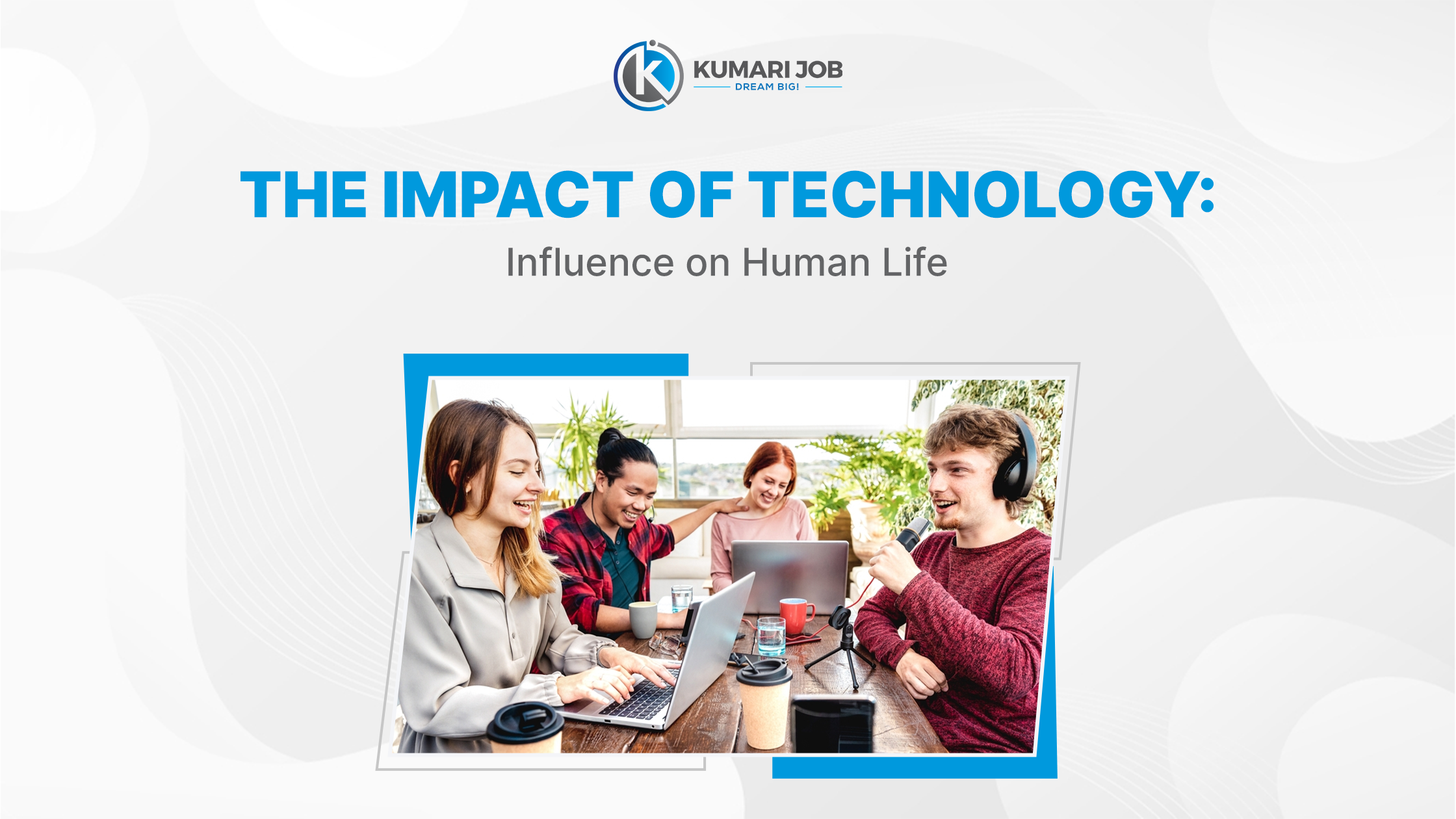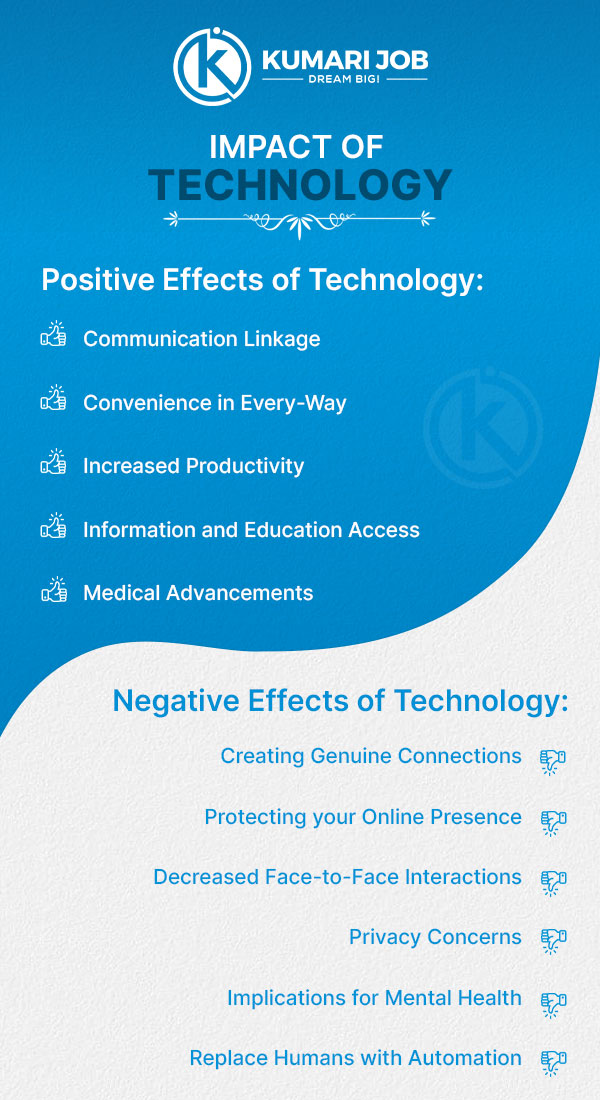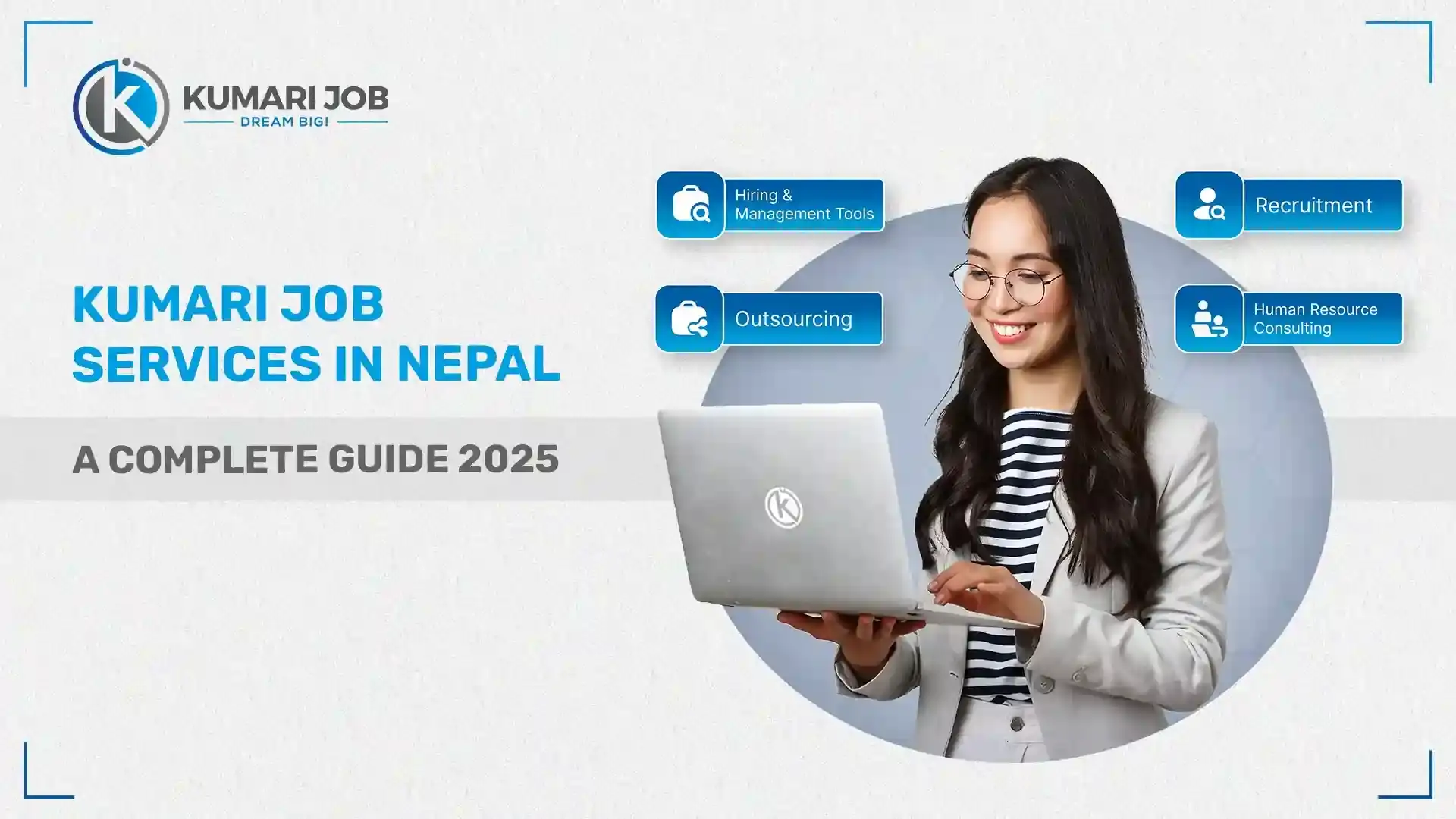
Introduction
Did you know that the average person spends approximately 7 hours daily on digital devices? It's a remarkable statistic highlighting technology's impact on our lives.
Remember this: Technology is there to greet us when we wake up. Our alarm clocks, smartphones, and coffee makers have become integral to our daily routine. This digital rug follows us throughout the day, whether in the form of smart home devices, dependable computers, or our constant companion, our cell phone.
In the blink of an eye, the world has been transformed by the inevitable rise of technology. Our lives have been drastically impacted since the advent of the internet age, with the omnipresence of smartphones and the emergence of artificial intelligence. But what are the actual consequences of this digital revolution? How has technology changed the way we live, work, and communicate? In this blog post, we'll look at the web of technology's impact, its incredible benefits and the issues it poses.
In this blog
Why Do We Need Technology?
From video calls that bring loved ones closer to global collaborations that cross borders, technology has profoundly impacted communication. It has a significant impact on our lives, changing the way we interact with one another. Let’s understand why we need technology.
Why Do We Need Technology?
1. Enhanced Communication
- Bridging distances and fostering connections
- Facilitating global collaboration and knowledge-sharing
2. Efficiency and Productivity
- Streamlining tasks and optimising workflows
- Boosting output and reducing manual effort1
- Access to Information and Education
- Empowering individuals with a wealth of knowledge
3. Enhanced Communication
Bridging distances and fostering connections
In today’s fast-paced world, the effect of technology cannot be overstated. It is a vital channel, bridging geographical boundaries and developing relationships previously limited by distance. Technology helps us to share moments, discuss our thoughts, and stay in touch with loved ones no matter where they are through video calls, instant messaging, and numerous social networking platforms.
Apps like Whatsapp, Messenger, and Telegram enable real-time conversations, providing a quick and convenient way to communicate with people regardless of their location.
- Facilitating global collaboration and knowledge-sharing
Technology promotes worldwide collaboration and knowledge-sharing. It allows people from various backgrounds and locations to get together and share their collective expertise for mutual benefit. Teams can collaborate on projects across borders and time zones using features like video conferencing and cloud-based collaboration provided by multiple software.
According to LinkedIn, 72% of employees believe that automation can never replace the human touch. Technology should never be seen as a replacement for human connection; instead, it should be a powerful tool to support those connections. This global collaboration illustrates the transformative impact of technology on how we collaborate and innovate in the current world.
Efficiency and Productivity
Streamlining tasks and optimising workflows
Do you ever wish a personal assistant could help you with time-consuming and challenging tasks? This is precisely what technology does for us! It's all about efficiency, from managing schedules to analysing data. Automation and smart devices allow us to effortlessly get through tasks and free up more time for creativity and strategic thought.
Now, you might wonder, why do we need technology? The answer is found in its unique ability to improve our daily lives. Technology has become an essential element of our existence, whether it is simplifying complex processes or connecting us to a world of knowledge.
Boosting output and reducing manual effort
Consider technology your dependable workplace companion. It is not about replacing humans but rather about enhancing the skills. The heavy lifting is done by advanced machinery and automated systems, allowing us to focus on fine-tuning and innovation. The result is increased productivity, excellent prospects for advancement, and a more meaningful work life.
So, what is the essence of technology? The influence is undeniable. It empowers us by making things easier and allowing us to achieve more. However, it is essential to approach it thoughtfully, acknowledging the negatives of technology and seeking balance.
Access to Information and Education:
Remember the days when finding information meant flipping through encyclopedias? The entire world's knowledge is now just a click away. The internet, our modern-day library, contains a wealth of information. It has transformed learning, allowing us to pursue our interests, gain new skills, and stay informed.
Education should have no boundaries, and technology is ensuring that. Online classrooms, digital libraries, and interactive courses reshape the educational landscape. Whether you live in an urban city or a remote village, quality education is available. It's a game changer, ensuring everyone can access quality education and better information.
Empowering individuals with a wealth of knowledge
You might require a mentor to guide you through your career or follow your passion for your interests. No one can pursue their passions without a mentor's guidance and the right direction. This is where technology comes into play, bridging the gap between your passion and the guidance you seek. This is the capability of technology! Online classes, forums, and blogs connect us with professionals and enthusiasts from all over the world. The knowledge is available whether you want to study a new language or explore quantum physics.
Technology bridges the gap between curiosity and expertise, ensuring that information and guidance are readily available no matter where you are.
The Impact of Technology on Human Life
Imagine a world without smartphones, the internet, or digital tools that have become inseparable from our daily routines. It's a challenge. This blog section explores how technology shapes our existence, highlighting technology's positive and negative impacts.
Impact of Technology on Human Life
Positive impact
- Communication linkage
- Convenience in every way
Negative impact
- Creating Genuine Connections
- Protecting your online presence
Positive impact
As we discuss this digital landscape, it becomes clear that technology is no longer a luxury but an essential component of modern existence. Let us take a moment to acknowledge the beautiful features that have found their way into our daily lives.
Communication linkage
Think about how we communicate with friends and family today. Gone are the days of waiting for a letter in the mail or struggling with patchy long-distance calls. Nowadays, technology acts as a helpful friend, allowing us to communicate with loved ones no matter where they are. The transformation in how we communicate has been one of the most remarkable gifts of technology.
Today, technology serves as a bridge, effortlessly linking us to loved ones worldwide and showcasing the profound impact of technology on our interpersonal connections. Whether through video conversations, instant messaging, or social media, our world has narrowed and become more intimate.
Convenience in every way
Consider the countless advantages that technology brings to our lives, underlining the huge influence of technology on our daily activities. From GPS navigation to the wonders of online buying, our tasks are eased, and our experiences are enhanced. Need a ride? It's as simple as a few taps on our smartphones. We can call for a ride, order groceries, or access information in seconds.
We can access knowledge, study new topics, and keep up with the latest news in seconds. This immediate access enables us to be more informed, connected, and engaged with the world. It is more than a tool; it is a partner who makes our everyday journey more efficient, enjoyable, and connected.
Negative impact
While technology has many benefits, it is essential to acknowledge that this digital revolution also offers disadvantages. It, like any powerful tool, demands careful thinking and mindful application.
Creating Genuine Connections
In pursuing digital connectivity, let us not overlook the value of face-to-face contact. Imagine the warmth of a real smile, the comfort of a reassuring touch, or the shared laughter that can only occur when others are present in the moment. These are priceless moments that the influence of technology will never be able to replace fully.
So, although we embrace the digital world and its beauties, let us also remember to treasure the simple yet profound beauty of personal connection. Allow yourself the time to unplug, like taking a digital break and enjoying the delight of shared experiences and meaningful talks. Take time for yourself and enjoy the thrill of interactions and meaningful discussions.
Protecting your online presence
As we enjoy the digital sphere, we must safeguard our digital footprints. Simple measures like strong passwords, two-factor authentication, and mindful sharing of personal information can keep our online interactions safe and pleasurable. It's like putting a lock on your virtual door, providing you peace of mind in the digital arena.
Furthermore, being up to date on the latest cyber risks and fraud is an act of prevention. It's similar to having a watchful security system in place that is continually checking for potential breaches or weaknesses.
Technology’s effects: Positive and Negative technology's impact on human life.
Understanding technology's positive and negative effects allows people to make more informed decisions. Striking this balance will enable us to fully utilise technology's potential for a more beneficial and fulfilling human experience.
Positive Effects of Technology
In the present day, when arguments about the impact of technology on human life and the significance of reducing screen time are becoming more common, it's essential to understand technology's dual nature.
i. Increased Productivity
The technology operates as a multiplier, providing solid tools that streamline work and make managing our daily lives easier. It improves our efficiency and allows us to accomplish more in less time. Consider word processors, which speed up document creation by enabling us to draft, edit, and format text with remarkable speed and accuracy. Furthermore, project management software transforms how we manage complicated operations by enabling seamless collaboration, work allocation, and progress tracking.
We can now do more in less time because of technological breakthroughs, bringing out a new level of productivity in our professional and personal lives.
ii. Information and Education Access
The Internet is a valuable knowledge store, providing novel access to information and educational materials. Whether you want to study more about a specific topic or pursue a formal degree through online courses, technology has opened up learning, tearing down boundaries and opening up new opportunities for personal development.
It breaks down borders, making education available worldwide and allowing people to pursue their passions and interests remarkably quickly.
iii. Medical Advancements
In healthcare, technology acts as a catalyst for revolutionary breakthroughs. Technology has transformed the healthcare business, from telemedicine consultations that span geographical distances to life-saving medical equipment and surgical robots that improve precision. It has improved patient care, diagnostic accuracy, and treatment outcomes, saving lives.
This technological revolution in healthcare has improved patient treatment and contributed significantly to the growth of medical science in general, paving the way for a healthier and more prosperous future.
Negative Effects of Technology
While these positive effects indicate technology's limitless ability to improve our lives, it's also crucial to be aware of the negative effects of technology and the growing problem of screen fatigue.
i. Decreased Face-to-Face Interactions
There is a rising concern in today's digitally connected world about the decreasing frequency of face-to-face interactions. The ease of digital communication frequently leads to fewer in-person social connections, potentially undermining the depth and quality of our relationships. According to ricejournal.net, overusing screens can diminish the capacity to recognise facial expressions and interpret body language, making it challenging to convey and understand messages accurately. It underlines the significance of human connections as an essential component of our social fabric. In an increasingly digitalised environment, prioritising interaction with others is vital in preserving authentic, meaningful relationships.
ii. Privacy concerns
With the rapid growth of technology, personal information security has become a crucial issue, underscoring the need to address the technology's effects and the influence of technology on our privacy. The more connected our lives get, the more vulnerable we become to potential confidentiality attacks. It is critical to raise our understanding of the impact of technology on our data. This increased awareness compels us to be more careful in adopting strong security measures to protect our personal information in the current digital world.
Setting priorities for privacy safeguards has become essential for protecting our personal information in an age where technology plays an increasingly important part in our daily lives.
iii. Implications for Mental Health
As we discuss reducing screen time, we must address the mental health consequences of prolonged screen exposure. A deliberate effort to reduce screen time can help manage and minimise the emotions of worry, depression, and loneliness that may result from excessive device usage. Understanding the benefits of limiting screen time encourages people to live healthier lives by establishing a balance between technological advances and mindful screen usage. Furthermore, knowing about these negatives of technology highlights the significance of setting boundaries and adding regular digital breaks into our routines. By doing so, we can proactively reduce the threats to our mental health and build a healthier relationship with technology.
Therefore, prioritising mental health and adopting techniques that promote a balanced and mindful approach to digital interactions are essential for developing a more beneficial relationship with technology.
iv. Replace humans with Automation
Automation is one of the negatives of technology on jobs. Machines and algorithms are increasingly capable of performing tasks that belong to humans. Manufacturing, customer service, and even some aspects of healthcare are included. As a result, specific job categories risk being replaced by technology, potentially displacing many workers. The rapid pace of technological change frequently beats workers' ability to adapt. This results in a skills mismatch, in which the abilities demanded by employers may not align with the expertise possessed by the workforce. Individuals must continuously learn and upskilling to stay relevant in the job market. According to the World Economic Forum's "The Future of Jobs Report 2020", AI is predicted to replace 85 million jobs worldwide and create 97 million new jobs by 2025.
The Role of Technology in the Future: Technology for Life
As we stand on the edge of a new era, technology is evolving quickly and is ready to transform our world in unimaginable ways. In the next section of the blog, we'll look at some of the exciting developments shaping technology's future.
Role of Technology in the Future
1. The dominance of Artificial Intelligence and Machine Learning:
2. Revolution in Quantum Computing:
3. Integration of Augmented Reality (AR) and Virtual Reality (VR):
4. Internet of Things (IoT) and Connectivity:
5. 5G and Beyond
1. The dominance of Artificial Intelligence and Machine Learning
Artificial intelligence, or AI, allows computers to think and learn as humans do. It's like teaching a computer to be extremely intelligent. Machine Learning is a subset of artificial intelligence. It's similar to teaching a computer to learn from data. You give the computer many examples, and it figures out patterns independently. AI and machine learning are set to transform how we interact with technology. As algorithms get smarter, they can handle tasks that require human-like reasoning. Natural Language Processing (NLP) will enable machines to understand and respond to human language at a high level. Additionally, devices will improve their ability to recognise and understand images, which could be game changers in healthcare and self-driving cars.
According to un.org, 800 million people could lose their jobs to automation by 2030, while polls reveal that most employees worry they do not have the necessary training or skills to get a well-paid job. Furthermore, AI will aid in making faster and more accurate decisions in finance and healthcare.
2. Revolution in Quantum Computing
Quantum computing is a very different type of computing than the computers we use today. Ordinary computers use bits that can be either 0 or 1. Quantum Computing uses Quantum bits (qubits) that can be 0 and 1, making them extremely powerful. Consider a computer that is far more powerful than what we currently have. That is the promise of quantum computing. This has the potential to transform industries that rely on complex math entirely. Things like how we secure information (cryptography) will have to be completely reinvented. It can solve highly complex problems, such as figuring out the best way to design a new drug or cracking secret codes.
Quantum computers have the potential to perform these tasks much faster than traditional computers. In addition, quantum computing can accelerate the development of life-saving medications.
3. Integration of Augmented Reality (AR) and Virtual Reality (VR)
Augmented Reality, or AR, is similar to adding a digital data layer to the real world. Consider looking through a special pair of glasses or the camera on your phone and suddenly seeing extra things on your screen. Similarly, Virtual Reality, or VR, is like getting into a new world that isn't real but feels very real!
Now, think of AR and VR technologies that allow you to experience things in new ways. They aren't just for fun. They will take students on virtual field trips to historical and educational locations and times. In healthcare, they will assist surgeons by displaying vital information during operations. For work, VR can be used to create virtual offices where team members can collaborate as if they were in the same room, no matter where they are.
4. Internet of Things (IoT) and connectivity
The Internet of Things connects everyday objects and devices that allow them to collect and exchange data. Essentially, it's about making "smart" things that can communicate with each other and humans. Imagine your fridge alerting you when it's running low on milk or your car alerting you to upcoming maintenance needs. It is rapidly expanding. It is spreading beyond smart homes and into industries. This means more information sharing and making decisions in real-time, which is the great influence of technology, be it home or enterprise.
Real-time communication between traffic lights, cameras, and sensors optimises traffic flow. Factory machines will communicate with one another to improve production efficiency and prevent breakdowns. This results in less time spent stuck in traffic and lower carbon emissions. Furthermore, cities can be more sustainable by fine-tuning energy consumption based on actual demand.
5. 5G and Beyond
5G technology's future is fascinating! It will significantly improve the speed of our internet. This means we can download files faster and watch videos without interruptions. However, it is not only about speed. 5G will also improve the performance of self-driving cars and smart homes. It will allow them to communicate quickly, ensuring everything runs smoothly and safely. Consider doctors performing remote surgeries or playing ultra-realistic video games. And it will help with traffic and energy use in cities, making our lives easier and better.
So, 5G is about making our world more innovative and connected, not just faster internet! The impact of technology on human life will be profound in the near future. 5G and IoT advancements will reshape how we interact with the world around us.
We must approach technological advancements with a balanced perspective, acknowledging both their vast potential and the need for responsible use.
Conclusion
In today's digital age, the impact of technology on human life is evident. Technology is seamlessly connected to our lives, transforming how we connect, work, and exist. The influence of technology is clear, with the average person spending 7 hours daily on digital devices. From morning alarms to constant companions in smartphones, it's now indispensable. However, we must overcome challenges such as reduced face-to-face interactions and privacy concerns. The rapid evolution of technology has the potential to transform our lives. AI, Quantum Computing, AR, and IoT are reshaping industries and improving our convenience.
As we embrace these changes, we must navigate them with an awareness of their consequences and strive for a balanced approach between innovation and human connections. Finding equilibrium between the digital and physical worlds is crucial to maximising technology effects for a balanced future.
- Did I miss anything? Now I’d like to hear from you.
- In your opinion, What could be the future of technology?
- Let me know your thoughts on the comment.
Read more related articles at career tips: Blogs/Career tips.
Frequently Asked Questions
Technology has revolutionised communication by bridging geographical distances and fostering connections through video calls, instant messaging, and social networking platforms. It has also facilitated global collaboration and knowledge-sharing, enabling people from different backgrounds and locations to come together and share their expertise.
To protect personal information, people should use strong passwords, enable two-factor authentication, and be careful when sharing sensitive information online. It's also critical to stay current on cybersecurity risks and potential threats.
Setting boundaries for screen time, prioritising quality time with loved ones, and deliberately attempting to engage in face-to-face conversations and activities are all part of balancing digital and in-person interactions.
While technology has many advantages, it is important to be aware of potential disadvantages. These include decreased face-to-face interactions, privacy concerns about personal information security, and potential mental health consequences from excessive screen time.
Strategies include setting aside designated "tech-free" times, practising mindfulness, engaging in physical activities, and seeking real-world experiences. These actions promote a healthier relationship with technology and support overall mental well-being.

.jpeg)







Loading Comments...